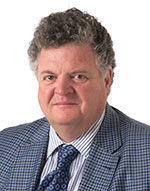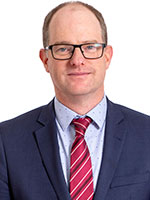Erectile dysfunction is a common side effect of radical prostatectomy, which is an operation to remove the prostate gland and surrounding tissues after a diagnosis of localised prostate cancer.
While this surgery can be lifesaving, it can also damage the nerves responsible for erections.
About 10,000 radical prostatectomies are performed in Australia every year - and about 7000 of these men will suffer erectile dysfunction as a result. Unfortunately, even patients who opt for the “nerve-sparing” technique can experience problems achieving an erection after the surgery.
Until now, the options available to men trying to revive their sex lives have been limited. These have included injections into the penis that can be painful, vacuums, or surgically implanted prostheses.
Many patients who undergo this new technique will, within 12 months, be able to achieve spontaneous and lasting erections - reinvigorating intimate relationships and dramatically boosting self-esteem and confidence.
A new procedure, pioneered in Melbourne by microsurgeon Professor Christopher Coombs and urologist Dr David Dangerfield, has been found to achieve success in restoring potency after prostate surgery. A study published in the prestigious urology journal European Urology found erectile function was restored within 12 months of surgery for 71 per cent of men left impotent by prostate surgery. Overall, 94 per cent of men in the early study reported “significant improvements in sexual function”.
The minimally invasive operation works by using nerves taken from the lower limbs to re-establish neural pathways to the penis providing the chemicals that initiate erectile activity. First, a 30cm section of the sural nerve - taken from the calf - is transplanted into the groin. One end of this nerve is grafted onto the main nerve in the upper thigh - the femoral nerve - and the other end is inserted into the penis. This process is performed twice; once on each side of the body.
Over the following months, nerve fibres regenerate on both sides - from the femoral nerves travelling down via the graft into the penis - gradually restoring erectile function.
The novel nerve grafting technique is minimally invasive. It achieves the best rates of restored erectile function after prostate surgery of any surgical procedures currently available, dramatically improving the quality of life of most patients. Seven out of 10 men who undergo this procedure are able to sustain erections for satisfactory sexual intercourse, and the majority enjoy significant improvements in sexual function.
It is important to note that all surgery involves some level of risk and outcomes may vary. This information is not intended as personal advice nor recommendation. You should seek independent medical advice to determine whether the procedure is right for your individual circumstances.
The surgery takes about 3 hours, and requires only a one-night stay in hospital.
Most patients will notice small gradual improvements to sensation and erectile function at around six months after surgery, with the full effects felt by 12 months. As nerve fibres grow at the rate of about 1mm a day, it takes about a year for the new nerve connection to grow from the thigh nerve to the penis.
The procedure is only available to patients who meet certain criteria. Men must be aged under 70 and have had their radical prostatectomy within the past five years.
Men must also have experienced:
- Normal erectile function prior to the radical prostatectomy
- PSA levels <0.1ng/ml in their most recent test following the procedure
- Persistent erectile dysfunction despite using oral and/or injectable therapies afterwards
However, men who have hormonal related conditions or diabetes, used radiotherapy to treat prostate cancer and/or androgen deprivation therapy will not be deemed suitable.

Professor Chris Coombs
Professor Christopher Coombs is the Medical Director and Chief Plastic Surgeon at Southern Plastic Surgery. He trained in Melbourne in aesthetic, plastic and reconstructive surgery after completing his medical degree through Monash University graduating with Honours.
On completion of his training in plastic surgery in 1992 he did further postgraduate studies at Harvard University in the field of Paediatric hand and microsurgery. He has particular interests in Paediatric plastic surgery, hand surgery, cosmetic surgery including Intense Pulsed Light Therapy and general Reconstructive Plastic surgery including breast reconstruction and skin cancer.
His interests in Paediatric Plastic surgery include hand and microsurgery, facial palsy and ear reconstruction. He currently is Director of the Plastic and Maxillofacial Surgery Unit at the Royal Children's Hospital in Melbourne and is an examiner in Plastic and Reconstructive Surgery for the Royal Australasian College of Surgeons. He has previously been the Chairman of the Victorian Board of Plastic and Reconstructive Surgery and Deputy Chairman Australasian Board of Plastic Surgery, Royal Australasian College of Surgeons.
His other areas of practice are simple and complex hand surgery including endoscopic carpal tunnel release, removal of skin cancers. His cosmetic practice includes breast reduction/augmentation, abdominoplasty, rhinoplasty and facial rejuvenation.

Dr David Dangerfield
David completed his medical degree at University of Queensland and completed Urology Specialist Training in Queensland before returning to his home city of Melbourne, where he undertook fellowship training in Advanced Laparoscopy at Monash Health. He was appointed at Monash where he has provided Specialist Urological Services over the last 10 years.
David acted as Director of Urology Training at Monash for 3 years, representing Monash Health at the Royal Australasian College of Surgeons. He has also provided private urological services to Melbourne's southeast suburbs over the last 10 years. He is a member of the Australian Medical Association, Urological Society of Australia and New Zealand and Royal Australasian College of Surgeons.
David has special interest in prostate cancer, kidney stone management, uro-oncology (kidney cancer, bladder cancer, testicular cancer), voiding dysfunction, vasectomy and erectile dysfunction.
To find out more contact Linacre Private Hospital on 03 9599 5502
Or fill out the form below: